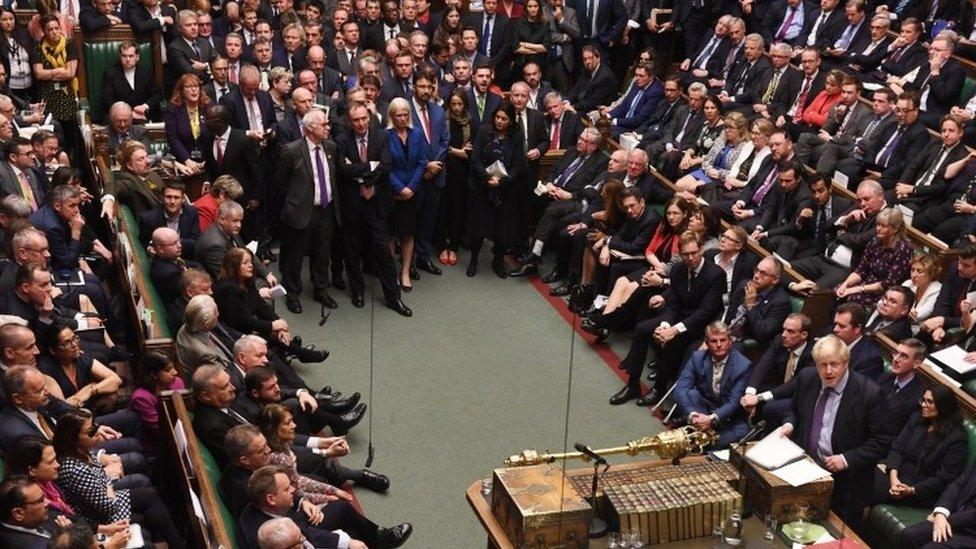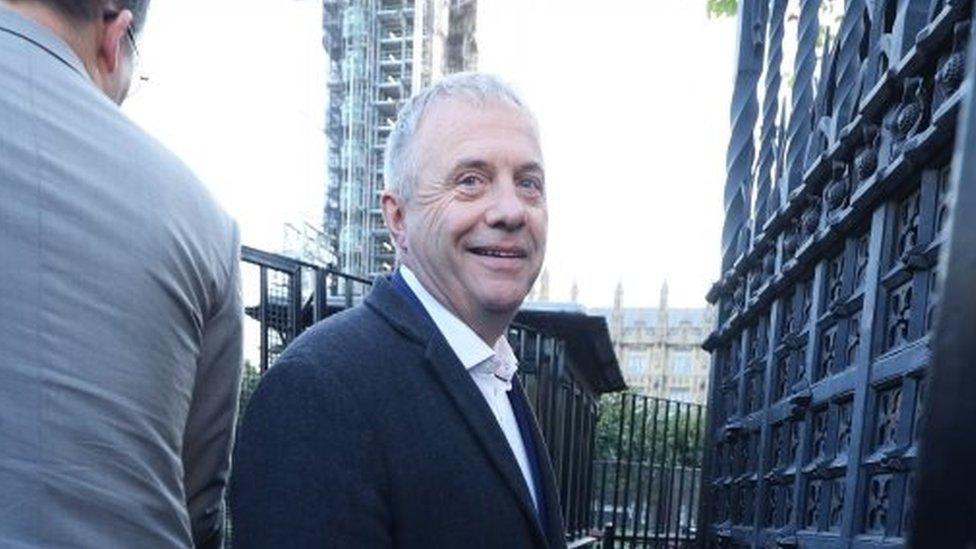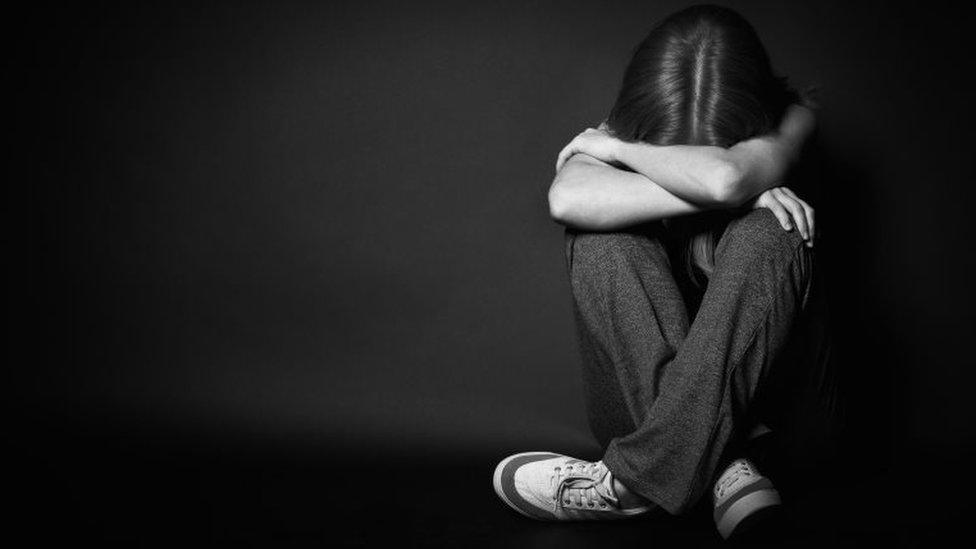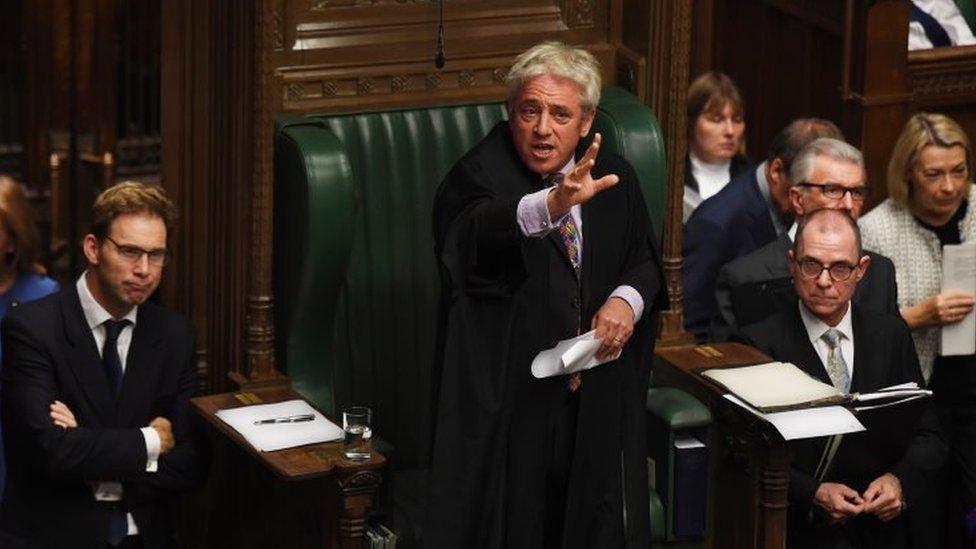Week ahead in Parliament
- Published

It's going to be a rather strange week in Westminster - with the tone of what follows dictated by the result of the government's latest attempt to trigger a general election.
Remember that under the Fixed-Term Parliaments Act, this requires a two-thirds majority, which is looking difficult to attain.
If it succeeds, both Houses will go into "washup" mode, speeding through any essential business, before Parliament is dissolved (dissolution would have to take place on 6 November at the latest, if the election was to be held on 12 December).
If, as seems more likely, the vote is not won, the government says it will cease to put Brexit legislation before MPs, even though its Withdrawal Agreement Bill actually achieved a majority of 30 votes.
How this will play out is anybody's guess - but in the absence of legislation to enact a Brexit deal, the UK would leave the EU without a deal, when any extended period of membership comes to an end.
Which suggests that there will be behind the scenes efforts to find some way out; either an agreement on the timetable for passing the Withdrawal Agreement Bill, with a deadline acceptable to the government and Labour, or some cunning fix to move to that early election.
So why is the timetable issue so important?
The Withdrawal Amendment Bill is a major piece of legislation which deals with all manner of vital issues - security cooperation with the EU, the rights of Brits in Europe, the mechanics of the proposed checks on goods moving between Northern Ireland and Great Britain, and the arrangements for the transition to the as yet un-negotiated long term relationship with the EU, to name but a few.
And that's before we get on to possible hostile amendments on a customs union or a referendum, or whatever.
And while, for many MPs, scrutiny of the detail of legislation is an empty ritual, during which they sign Christmas cards or answer letters, rather than engaging with the process, others will detect problems which might be critical to their constituents and local interests.
Ram the Withdrawal Agreement Bill through the Commons in 36 hours, runs the argument, and there would be little chance to address them, while a more leisurely process could head off any number of problems once the Bill becomes law.
But don't ignore the raw electoral strategy that lurks millimetres below the surface of this argument. The Conservatives are seeking to frame the Brexit battle as "the people versus Parliament".
But plenty of Labour MPs say they're simply not prepared to vote for an election at a time and on the ground of the prime minister's choosing.
They want the Conservatives to go into an election with their Brexit Party flank unsecured, and with their internal divisions over Brexit festering visibly.
Will the government go on 'strike'?
For the SNP and the Lib Dems the considerations are a little different - both want to stop Brexit, but now calculate that there are not enough votes in this Parliament to get a second referendum, and both believe they would win more seats, so increasingly feel they have nothing to lose - although again they are wary of letting the PM control the timing and context of any election.
Meanwhile, for all the talk of the government going "on strike" there is a fair wodge of (mostly rather humdrum) legislation landing in the Lords and the Commons this week, and the select committees are beavering away at their inquiries, conscious that the music might stop and an election might be called at any moment.
And there's an election for Speaker rumbling in the background, with MPs due to vote a week on Monday.

John Mann is standing down as an MP to head a government inquiry into anti-Semitism
Incidentally, one amusing sub-plot will be the departure from the Commons (probably on Tuesday, I hear), and immediate arrival in the Lords, of the Labour MP, John Mann.
He is leaving the Commons to lead the government's campaign against anti-Semitism, and plans to allow himself to be disqualified as an MP by the act of becoming a peer, rather than taking the more usual route of applying for an office of profit under the Crown, like the Steward of the Chiltern Hundreds or the Manor of Northstead (MPs can't simply resign, under rules dating back before the Civil War; they have to self-disqualify).
A writ for a by-election has to be moved as a motion, usually without notice in the House at the very beginning of proceedings before Question Time and there's a very strong tradition that the moving is done only by the chief whip of the party which held the seat at the point the vacancy occurred.
Mr Mann's Bassetlaw seat is precisely the kind of pro-Brexit blue collar seat the Conservatives will be targeting at the next election, so a by-election there (if not overtaken by an early general election) would be quite an event.
Here is my regular look at the week ahead in Parliament:
Monday 28th October
The Commons opens (14:30) with Home Office questions - look out for Labour MP Sarah Champion, who is campaigning to change the law so that it is a criminal offence to marry children under age 18.
At the moment 16-17-year-olds may marry with parental consent, but she is concerned that, often, the children (mainly girls) getting married at this age are pressured into marrying older men - it requires the child to recognise the marriage is coerced for it to count as a forced marriage.

MPs are concerned about pressure on young women to marry older men
After Question Time (and assuming no post-weekend statements or Urgent Questions intrude), the prime minister will make his third attempt to trigger an early general election.
Under the Cameron-Clegg Fixed Term Parliaments Act, two thirds of MPs (and we're talking about the total number, 650, not the number present at a particular vote, and including the non-attending Sinn Fein MPs and the Speaker and deputies) which means 434 MPs have to vote for the election.
In practice, this means that even were the SNP and the Lib Dems to support the motion, around 80 Labour MPs would also have to join the Conservatives in the Aye Lobby. And it is clear that even if Labour were to whip in favour of an election, many Labour MPs are still minded to vote against - essentially on the turkeys-early Christmas principle.
The government knows these numbers, and so they may be staging this vote as a piece of parliamentary theatre, to demonstrate that it is the Commons that is preventing the on-schedule delivery of Brexit.
Look out for some combative exchanges on points of order, after the result is announced.
There had been talk of the government "going on strike" and refusing to put legislation before Parliament if the vote is lost - but the Prime Minister's Official Spokesman now says that only Brexit legislation will be held back, and efforts to pursue a "dynamic and ambitious" domestic agenda "with full vigour" will continue.
The day's main debate will be on the Second Reading of the Environment Bill - a major 130-clause piece of legislation, setting up an Office for Environmental Protection, with scrutiny, advice and enforcement functions and allowing the government to set long-term, legally binding environmental targets on air quality, water, biodiversity, resource efficiency and waste reduction.

MPs are due to debate re-wilding and bioderversity
In Westminster Hall (16:30) MPs debate e-petition 254607: "Restore nature on a massive scale to help stop climate breakdown..... to avoid a climate emergency we need to act fast. Rewilding and other natural climate solutions can draw millions of tonnes of CO2 out of the air through restoring and protecting our living systems. We call on the UK government to make a bold financial and political commitment to nature's recovery."
The petition attracted 109,077 signatures.
My committee corridor pick is a session of the high powered joint committee on the National Security Strategy (16:15) on Biosecurity and human health: preparing for emerging infectious diseases and bioweapons. The key witness is Professor Chris Whitty, the Chief Medical Officer for England.
Elsewhere, look out for the Public Accounts session (16:00) on food safety and standards, with officials from the Food Standards Agency and the Department for Environment Food and Rural Affairs, and Housing, Communities and Local Government has its first encounter with the new Secretary of State, Robert Jenrick.
In the Lords (14:30), the day opens with the introduction of two new peers - Lord Hendy QC, a barrister specialising in employment law, who will sit as a Labour peer, and Baroness Hunt of Bethnal Green, the former Chief Executive of Stonewall, the lesbian, gay, bisexual and trans equality charity . She will sit as a Crossbench peer.
Questions to ministers include the Conservative, Lady Gardner of Parkes, asking about regulating websites like AirBnb and assessing their impact on the availability of housing for rent.
There will be a short debate on vocational education and training in secondary schools - and then peers move on to the Second Reading of the Historical Institutional Abuse (Northern Ireland) Bill, which establishes the Historical Institutional Abuse Redress Board and provides for compensation for children abused in certain institutions. It also creates a Commissioner for Survivors of Institutional Childhood Abuse.
Tuesday 29th October
MPs open (11:30) with Health and Social Care Questions,
The main debate is a re-run of the Second Reading of the Animal Welfare (Sentencing) Bill - this had a second reading in July, and had strong cross-party support, but fell when Parliament was prorogued. Its aim is to provide a greater deterrent to animal cruelty by extending the maximum sentence possible, from six months to five years in England and Wales.
In Westminster Hall, subjects for debate include the proposed reinstatement of the Colne to Skipton railway link (09:30); the funding of Liverpool City Council (11:00); Endometriosis workplace support (14:30); bus services in Cumbria (16:00) and government support for economy and innovation in Northern Ireland (16:30).
It's a busy day on the committee corridor, with Health and Social Care (14:30) quizzing a high powered panel of expert witnesses in their follow-up inquiry on Childhood obesity, and then three ministers, Nigel Adams, Minister for Sport, Jo Churchill, Health Minister for Prevention, and Luke Hall, Minister for Local Government and Homelessness. Foreign Affairs looks at the future of Britain's diplomatic relationship with Europe (14:45);Environmental Audit meets the new Secretary of State for Environment, Food and Rural Affairs, Theresa Villiers (14:15); International Development taking evidence from Africa Minister Andrew Stephenson on humanitarian crises in Africa (13:30) and Defence will be hearing from experts and the Police about the domestic threat of drones (14:00);
In the Lords (14:30) the day opens with the introduction of Lord Ranger, Raminder Singh Ranger, a refugee from the 1947 partition of India, who became the chairman of the British Sikh Association and joint chairman of the Conservative Friends of India.
The main business is the Second Reading debate on the Health Service Safety Investigations Bill which will establish a new independent Health Service Safety Investigations Body. Health minister Baroness Blackwood of North Oxford leads for the government.
Wednesday 30th October
The Commons begins (11:30) with half an hour of Northern Ireland Questions, followed by Prime Minister's Question Time - the last to be presided over by John Bercow - will he stretch it over the one-hour mark?
That will be followed by a general debate on Grenfell Tower.
In Westminster Hall the debates include: building out extant planning permissions (09:30); integrated foreign policy after the UK leaves the EU (11:00); child poverty in Scotland (14:30); bus passes for 1950s women (16:00) and the contribution of the Gujarati community to the UK (16:30)
Once again there's plenty of select committee activity. The Treasury committee, under new management with former Treasury Minister Mel Stride now in the chair, has a session on regional imbalances in the UK economy (14:15). Northern Ireland Affairs takes evidence on consultation on implementation of the Stormont House Agreement, (09:30); Work and Pensions focuses on the new Pension Schemes Bill (09:30). And Women and Equalities (09.50) has its first evidence session on its inquiry into prostitution, with Criminology Professor Teela Sanders, Lynette Woodrow, the deputy chief Crown prosecutor for London South, and Prof Marianne Hester, who holds the chair in gender, violence and international policy, at the University of Bristol. Business, Energy and Industrial Strategy (10:00) has a follow-up session on the rolling out of smart meters.
In the Lords (15:00) the main business is the Second Reading of the Pension Schemes Bill, which has cross-party support and deals with protecting Collective Defined Contribution schemes. These schemes exist in other countries, notably the Netherlands, but are new to the UK. Major supporters have been the Royal Mail and the Communication Workers Union and there has been considerable cross party discussion, involving Labour's Jack Dromey.. The Bill also creates new criminal offences and financial penalties, gives the Pensions Regulator more powers, intended to prevent more BHS-type problems and will aim for closer supervision and larger penalties. It also sets up the proposed Pensions Dashboard system.
Thursday 31st October

John Bercow retires from the Speaker's chair on Thursday
The Commons day opens (09:30) with 40 minutes of Environment, Food and Rural Affairs Questions, followed by mini-question times to the MPs who speak on behalf of the Church Commissioners, the House of Commons Commission, the Public Accounts Commission and the Speaker's Committee on the Electoral Commission.
And the Leader of the House, Jacob Rees Mogg. will make the weekly business statement, setting out the forthcoming agenda for the Commons. Because this will be Speaker Bercow's last day in the chair, there will probably be some tributes - maybe rather barbed ones in some cases, and there will then be an opportunity for tributes to the Speaker's Chaplain Rose Hudson Wilkin, who is leaving to become Bishop of Dover.
The main debate will be a general debate on spending on children's services.
In the Lords (11:00), questions to ministers includes Labour's Lord Dubs asking about the Demands of Extinction Rebellion.
The main debates are on the Phase 1 report of the Grenfell Tower Inquiry and then on the government's international development work to promote the sustainable use of natural resources and prevent biodiversity loss.
Neither House is scheduled to sit on Friday, 1 November.
